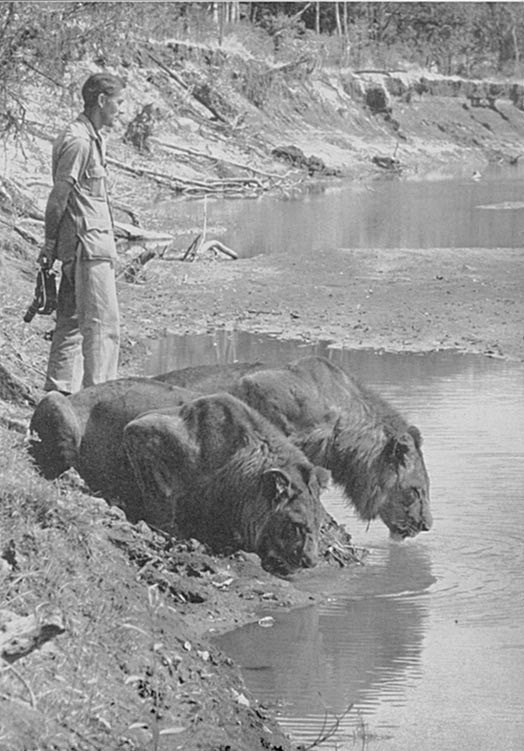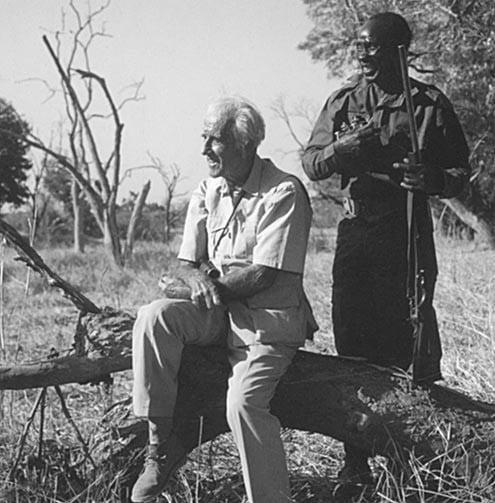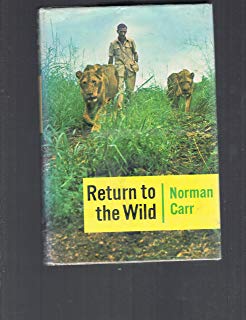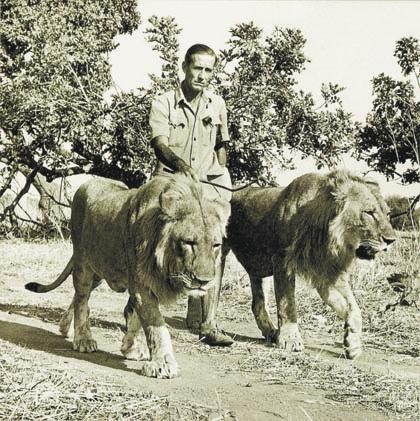Norman Carr
Reagarded as the pioneer of walking safaris in Africa
Norman Carr
Norman Carr has become a name synonomous with walking safaris in Zambia. Way back in 1950, he initiated a far-reaching and visionary conservation concept which was to pave the way for modern conservation and tourism in Zambia. He encouraged Senior Chief Nsefu, who was the Chief of the Kunda people in the Laungwa Valley, to set aside some land for a Game Reserve. Over the years he built camps and started up his famous walking safaris all in an effort to promote tourism into this area.
Carr helped establish the Rhino Trust in the 1970s (now under the WWF), helped return two lion cubs (Big Boy & Little Boy) to the wild, and provided wildlife education to local children in the South Luangwa Valley through the Kapani School Project, which has been running since 1986.
Norman Joseph Carr, MBE (19 July 1912 – 1 April 1997) was a British conservationist working in Central and Southern Africa. He was influential in setting up National Parks in Malawi (Nyasaland), Zambia and Zimbabwe (Rhodesia) in the 1950s and 1960s. In Zambia, his vision of Conservation through Tourism led him to set up the country’s first safari company, Norman Carr Safaris, with a focus on local employment and empowerment. He is widely regarded as the pioneer of walking safaris as part of non-consumptive tourism (photography safaris) in Africa.
Carr was a man ahead of his time; during the era when safari was a track-and-hunt tradition, Norman Carr broke the mould and created conservation-based tourism.
In 1950 he petitioned Senior Chief Nsefu - Paramount Chief of the Kunda people in the Luangwa Valley - to set aside a portion of tribal land as a Game Reserve and built the first game viewing camp open to the public in Northern Rhodesia (now Zambia). Proceeds from this went back to the community and eco-tourism in Africa was born. His dream was to secure the future of this unique wilderness by ensuring that the local population would benefit through conservation of the wildlife and habitat of the Luangwa Valley. This led to the birth of Norman Carr Safaris, which operates 5 camps in the South Luangwa Valley. Carr's legacy continues throughout Zambia as he inspired the next generation of conservationists, including Chris Liebenberg who founded Chongwe Safaris. Having grown up in Zambia, Liebenberg was influenced by Carr's values and wanted to replicate the conservation-through-tourism concept in the Lower Zambezi National Park. Both companies are now part of the tourist operation Time + Tide.Courtesy: Wikipedia
SAFARI ICONS - NORMAN CARR by Cameron Duncan - April 2012
Norman Carr was born in the busy port town of Chinde, in what is now modern day Mozambique, in 1912. He received his education in England and returned to Africa in 1930 where he worked as an ‘Elephant Control Officer’ in the Luangwa Valley. This majestically titled job entailed mitigating the damage done by the resident elephant herds on the crop of farmers in the area. After serving for four years in the Kings African Rifles, where he attained the rank of Captain, Norman became one of Africa’s first Game Rangers in the Luangwa Valley’s newly formed ‘Game Department’. It was in this role that Norman started implementing conservation measures which would be adopted throughout Africa.
Norman Carr persuaded the then Chief Nsefu to set aside some of his land for game conservation use, and this became Nsefu Camp – the first camp of its kind open to the public in what is now Zambia. Some years later a spinal injury, caused by a run in with a buffalo, necessitated a withdrawal from the scene for a year or so. After making a recovery, Norman returned to work as a Warden for the Kafue National Park. It was here that he famously adopted two orphaned male lions – characters which left an indelible impression on all who met them. Norman lovingly raised the pair to adulthood and later successfully reintroduced them in to the wild when they were about three years old (inspiring the novel and movie “Return to the Wild”). After cofounding the first hunting operation in the Luangwa Valley with Peter Hankin, it was in 1968 that Norman Carr’s next revolutionary idea came about…
Growing up in the wild, Norman was always very at home in the African bush. His deep understanding of the dynamic between man and animal meant that he read situations between the two very well. For Norman, a walk in the bush amongst the Big Five was part of his everyday life. So much so in fact that he decided to extend the opportunity of a Walking Safari to visitors of Chibembe Safari Camp. The safari walks were a smash hit! Never before had people experienced wildlife in such a manner, where man and nature interacted so harmoniously in such close proximity.
In his later years, Norman Carr continued in his unwavering quest to conserve and protect all wildlife. In 1979 he devoted two years of his life to the ‘Save the Rhino’ campaign aimed at eradicating the rampant poaching of the Valley’s rhinoceros population. Through the Kapani School Fund, Norman provided scholarships for many children in the area all the while engraining in them the importance of wildlife conservation. These were to be amongst his final acts as the great conservationist, Mr Norman Carr, passed peacefully in 1993.
Norman Carr’s pioneering spirit led to him becoming one of the most important figures in Zambia’s recent history, in the fields of tourism and conservation. His philanthropically inclined nature meant he was well liked and respected amongst his peers, and people in general. Next time you’re out on that amazing Walking Safari, tip your hat to Mr Carr…Way back in 1950, a young game ranger called Norman Carr initiated a far-reaching and visionary conservation concept which was to pave the way for modern conservation and tourism. He encouraged Senior Chief Nsefu – the paramount Chief of the Kunda people in the Luangwa Valley to set aside a portion of his tribal land as a Game Reserve and built the first game viewing camp open to the public in Northern Rhodesia (now Zambia). Revenue from the camp was paid directly to what was called in those colonial days “the Kunda Native Authority”.
His dream was to share his passion for this unique wilderness and to secure its future by ensuring that the local population would benefit by conserving the wildlife and infinitely varied habitat of the Luangwa valley.NORMAN CARR - TIMELINE
Norman was born in Chinde on 19th July 1912. Chinde was a British concession in Portuguese territory in Southern Africa used for transit of goods from ocean going ships into the Zambesi River and paddle steamers for Nyassaland (now Malawi).
1912 – 1919: He was sent off to school in England to, by his own admission, unremarkable academic acclaim. 1930 – 39: He returned to a varied career in Nyassaland including the hunting of garden raiding elephant and, on the basis of this experience, was appointed Elephant Control Officer in the Luangwa Valley. This was to replace the legendary Charlie Ross whose own career had been terminated by one of his quarry. 1940 – 44: Norman served with the King’s African Rifles in the Abyssinian campaign, attaining the rank of captain. On his return he was absorbed into the newly formed Game Department as one of their first Game Rangers in the Luangwa Valley. 1944 – 50: Norman initiated a far-reaching, even visionary concept by involving the local people in wildlife conservation, and by their benefiting financially therefrom. He encouraged Senior Chief Nsefu to set aside a portion of his tribal land as a Game Reserve. Nsefu Camp was built, which was the first game camp open to the public in Northern Rhodesia (now Zambia). Revenue from the camp was paid directly to the Kunda Native Authority. Norman was instrumental in organising the first formal professional Hunting safaris, which were run by the Game Department. 1951 – 56: He retired as Chief Ranger for health reasons after a spinal operation resulting from a buffalo injury. He was recalled from retirement as Warden to develop the Kafue National Park. 1957 – 58: Norman acquired two orphaned lion cubs, the raising of which resulted in the book and subsequent film “Return to the Wild”. He was transferred back to Luangwa to evaluate the wildlife and tourism development potential and he was able to live with the lions, teaching them to hunt and fend for themselves. 1960 – 61: The two lions, now mature males, were released into the North Luangwa National Park where he saw them a year later, thus concluding a successful reintroduction into the wild. He finally retired from government and started a private safari operation at Lion Camp in the north of the park. These were the first conducted game viewing tours in Northern Rhodesia. He also initiated guided walking safaris, which became known as wilderness trails. These were very popular and have since been emulated throughout southern Africa. In partnership with Peter Hankin, Norman started Luangwa Safaris, the first hunting operation in Luangwa, from the “old” Mfuwe Lodge. 1962 – 64: Zambia became independent in 1964. Norman moved to the “new” Mfuwe Lodge. He operated walking safaris out of numerous bush camps in the northern areas of the park. 1968 – 71: Norman established the original Chibembe camp in the park. He built the new Chibembe Camp. 1975 – 77: The original Chinzombo Camp was started as a green season extension to Chibembe. Norman initiated and devoted two years to the “Save the Rhino” campaign in an effort to combat the rampant poaching that was sweeping through the Valley. 1979 – 81: He worked as a freelance tour guide while building Kapani Lodge, his last home – which was opened in 1986 by His Excellency Dr. K. D. Kaunda. Norman worked hard to establish Kapani as a prime tourist destination. His last few years were spent largely on welfare and charitable projects. He assisted a great many children in primary, secondary and further education through the Kapani School Fund and devoted himself to awakening in young people an awareness of wildlife conservation and its importance to their future. 1993 – 97: Norman died on 1st April 1997, aged 84.Source: Conservation National Parks-CNP Zambia
ARTICLES OF INTEREST
Obituary: Norman Carr by Lynn ten Kate, The Independent May 1997
Norman Carr - Pioneer of walking safaris, South Luangwa Zambia (YouTube)
Return To The Wild - Norman Carr c1962 - Time + Tide, South Luangwa Zambia (YouTube)
PUBLICATIONS
Return to the Wild (Collins 1962)
The White Impala (Collins 1969) Some Common Trees and Shrubs of Luangwa Valley (1978) Valley of the Elephants (Collins 1980) A guide to the wildlife of the Luangwa Valley (Collins 1987) Kakuli (Old Buffalo) (CBC 1996)Go back to: Pioneers in conservation



